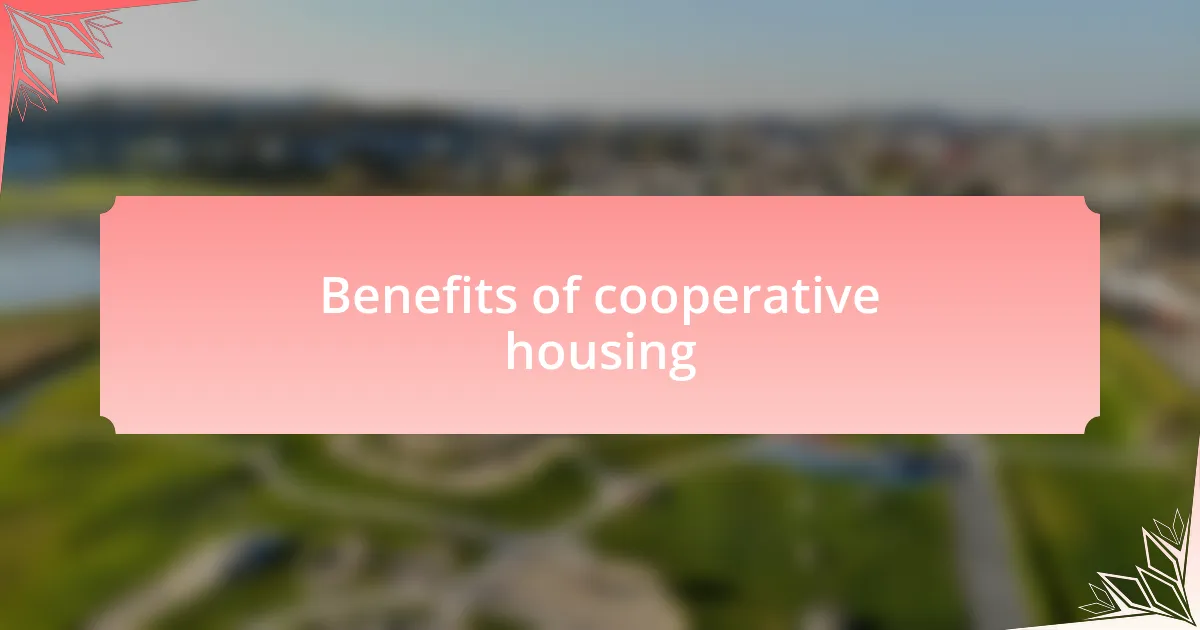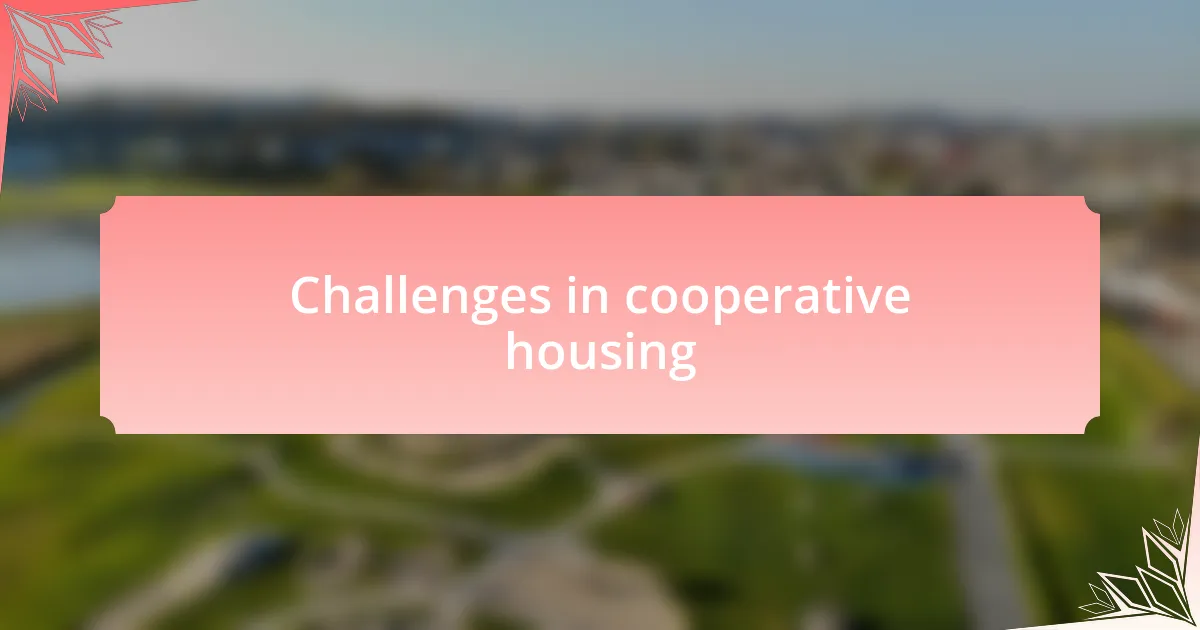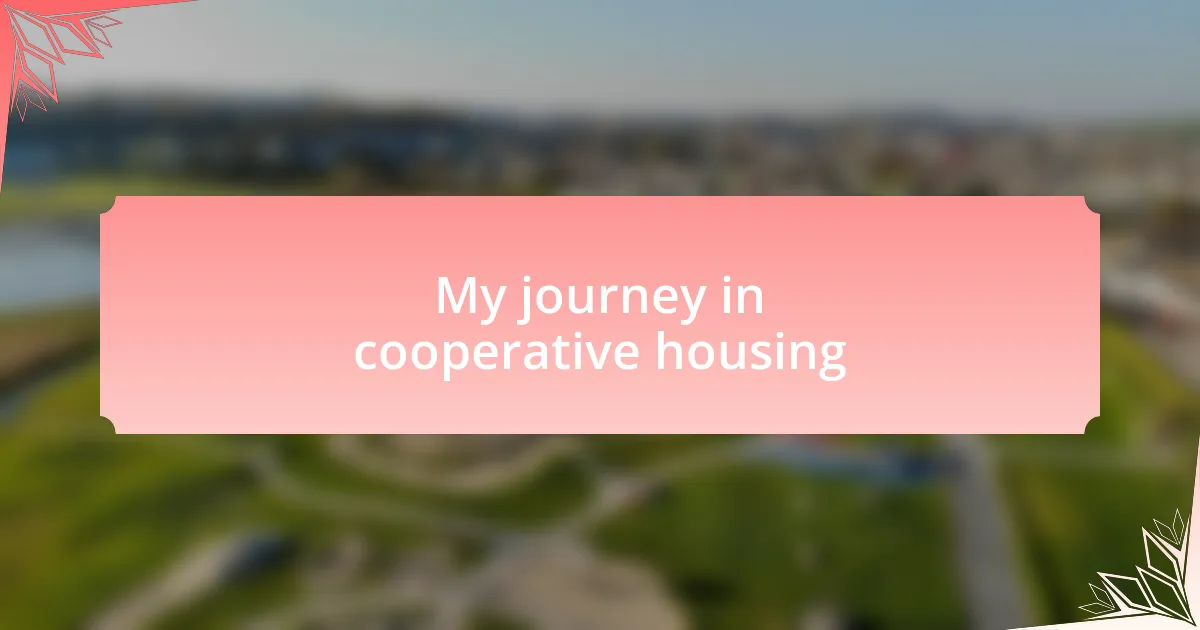Key takeaways:
- Cooperative housing fosters a strong sense of community and belonging through active participation in decision-making and shared responsibilities.
- Financial benefits arise from pooling resources, leading to lower costs and sustainable practices, enhancing individual well-being.
- Challenges, such as communication issues and member turnover, highlight the need for effective interaction and financial transparency to maintain harmony.
- Personal growth is a key outcome of cooperative living, encouraging residents to step out of their comfort zones and develop valuable skills.

Understanding cooperative housing
Cooperative housing is more than just a living arrangement; it’s a community built on shared values and responsibilities. When I first moved into a cooperative, I was struck by the sense of belonging among residents, which is something you don’t always find in traditional housing. Have you ever felt that rush of connection when you know your neighbors not just by sight, but by name and shared experiences?
Living in a coop often means contributing to the decision-making process, a unique aspect that fosters a strong sense of ownership. I remember attending my first monthly meeting; it was refreshing to see everyone actively engage in discussions about improvements to our common areas. That engagement turned mere houses into homes, as we collaborated on projects that actually reflected our collective values and needs.
Moreover, the financial aspects of cooperative housing can be a game-changer. Pooling resources allows us to keep costs manageable, which is especially helpful during tough economic times. Reflecting on my own journey, the lower monthly dues relieved some financial pressure, enabling me to invest in personal growth opportunities. Isn’t it amazing how living arrangements can influence not just our surroundings, but also our overall well-being?

Benefits of cooperative housing
One of the most significant benefits of cooperative housing is the emphasis on community and collaboration. I recall one summer when our cooperative organized a neighborhood BBQ. It wasn’t just about the food; it was an opportunity for everyone to come together, share laughter, and strengthen bonds. Experiencing that sense of unity reminded me that community support can significantly enhance our day-to-day lives.
Financial advantages are also a notable perk. In my co-op, we often discuss how cooperative living helps us save money on utilities and maintenance. I remember when we collectively decided to invest in energy-efficient appliances; not only did this reduce our bills, but it also made us more environmentally conscious. Isn’t it empowering to see how collective decisions can lead to both savings and sustainability?
Additionally, cooperative housing nurtures personal growth through shared responsibilities. I was initially hesitant about taking on roles like organizing events, but I learned a great deal about leadership and teamwork. Those experiences taught me the importance of stepping out of my comfort zone, proving that cooperative housing isn’t just about sharing space; it’s a platform for individual development within a supportive community. How often do we get the chance to grow alongside those who share our home?

Key features of cooperative housing
Cooperative housing embodies a unique structure where residents collectively own and manage their living space. I remember the first time I attended a co-op meeting; the air was charged with enthusiasm as we discussed everything from maintenance needs to community events. Engaging in these democratic processes not only fosters a sense of belonging but also empowers everyone to have a say in their home environment.
Another key feature lies in the shared responsibilities and decision-making that characterize cooperative living. It’s not just about having a roof over our heads; it’s about actively participating in building a thriving community. When I took charge of our monthly newsletter, I was surprised by how connected I felt to my neighbors. It encouraged open communication, leading to stronger relationships that transcend the walls of our homes. Isn’t it fascinating how such small roles can create lasting impacts on our interactions?
Cooperative housing also prioritizes affordability and stability. In my experience, the lower costs associated with a co-op meant I could allocate more funds toward personal interests and experiences. It was a relief to know I had a long-term place to call home, leading to a deeper investment in my community. Do you ever consider the importance of housing stability in nurturing a sense of belonging?

Challenges in cooperative housing
Navigating the dynamics of cooperative housing can be quite challenging. I recall a time when differing opinions on a renovation project led to heated discussions among members. It was frustrating, but it made me realize the importance of effective communication. Have you ever faced a situation where contrasting views threatened a collaborative effort?
Another hurdle that many co-ops encounter is financial management. I once participated in a budget review meeting that highlighted how critical transparency is. Some members weren’t fully aware of our expenses, which led to misunderstandings about maintenance fees. This experience taught me that we need to prioritize financial literacy within the community to ensure everyone feels informed and valued.
Additionally, member turnover can pose significant challenges in cooperative housing. I remember when several longtime residents moved out within a short period, leading to a mix of new and old members. It was both exciting and daunting, as we had to quickly build relationships and align our visions. How do you think frequent changes in community dynamics affect the overall stability of cooperative living?

My journey in cooperative housing
When I first joined the cooperative housing community, it felt like stepping into a new world. I remember my initial excitement mingled with a touch of anxiety—would I connect with my neighbors? Over time, I found that attending community meetings was instrumental in forming those connections. Have you ever experienced that moment when you realize you’re part of something bigger than yourself?
There was a particularly memorable moment during one of our community potlucks that truly solidified my sense of belonging. As we all gathered around, sharing dishes from various cultures, I felt the warmth of camaraderie enveloping us. It was refreshing to see how food could serve as a bridge, fostering conversations and helping us share our unique stories. Do you think those shared experiences can strengthen community ties in cooperative living?
Reflecting on my journey, I also discovered how conflict could lead to growth. I vividly recall a disagreement over common space usage that initially felt divisive. However, that challenge brought us together to create a solution that worked for everyone. It was through these discussions and negotiations that I learned just how resilient our cooperative spirit could be. How have you turned challenges into opportunities in your experiences?

Lessons learned from cooperative living
Living in a cooperative housing environment taught me the importance of communication. I remember a time when a misunderstanding about quiet hours sparked frustration among neighbors. Instead of allowing it to fester, we organized an informal gathering to talk it through. By openly discussing our expectations and listening to each other’s perspectives, we not only resolved the issue but also laid the groundwork for more effective communication in the future. Can you recall a time when a simple conversation transformed a situation for the better?
Another crucial lesson I learned was the value of shared responsibilities. In our cooperative, I initially felt hesitant to take on tasks like organizing clean-up days or planning events. However, once I embraced these roles, I experienced a newfound sense of ownership and accountability. It became evident that our collective effort not only maintained our shared spaces but also deepened our relationships. Have you ever felt that moment of pride when contributing to something you care about?
The beauty of cooperative living is its ability to nurture personal growth. I often found myself stepping outside of my comfort zone, whether it was leading a meeting or mediating a disagreement. These experiences pushed me to develop skills I never thought I had, like negotiation and empathy. I wonder how many of us truly realize the potential for growth that comes from engaging with our neighbors in meaningful ways.